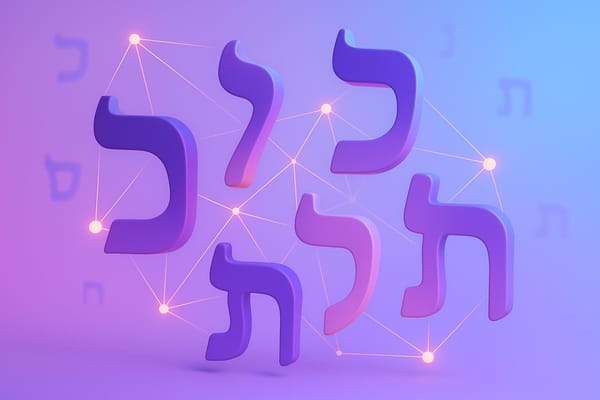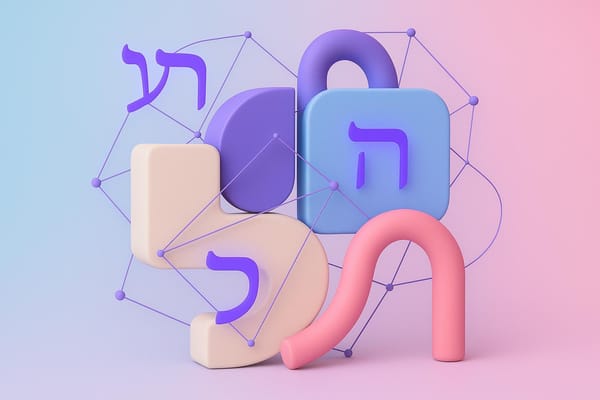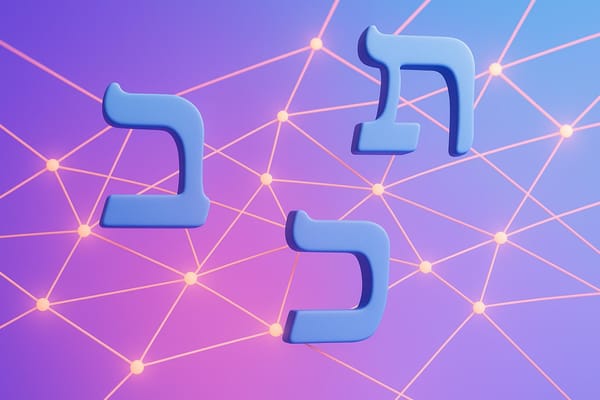Hebrew Travel Phrases: Essential Checklist
Enhance your travel experience in Israel by learning essential Hebrew phrases for greetings, dining, shopping, and emergencies.

Planning a trip to Israel? Knowing a few basic Hebrew phrases can make your experience smoother and more enjoyable. While English is widely spoken, learning Hebrew helps you connect with locals, navigate public transport, and handle everyday situations confidently. Here's a quick summary of what you'll find in this guide:
- Greetings: Start with simple words like "Shalom" (hello/goodbye) and "Todah" (thank you).
- Getting Around: Learn how to ask for directions, understand bus schedules, and discuss fares.
- Dining Out: Order food, ask for recommendations, and handle dietary needs with ease.
- Shopping: Bargain effectively and ask about prices in markets.
- Emergencies: Key phrases for medical help, police assistance, and urgent situations.
- Cultural Tips: Understand formal vs. casual speech, religious customs, and social etiquette.
This guide is perfect for first-time visitors, business travelers, or anyone looking to explore Israel beyond tourist hotspots. Let’s dive into the essentials to make your trip more memorable!
All Travel Phrases You Need in Hebrew! Learn Hebrew in 25 Minutes!
Greetings and Basic Phrases
Learning some basic Hebrew greetings and phrases can make your daily interactions in Israel much smoother. Here's a quick guide to help you get started.
Hello and Goodbye
The word 'Shalom' (שָׁלוֹם) works for both hello and goodbye. For specific times of the day, use 'Boker tov' (בּוֹקֶר טוֹב) for good morning, 'Erev tov' (עֶרֶב טוֹב) for good evening, or 'Layla tov' (לַיְלָה טוֹב) for good night. If you're looking for a more casual vibe, 'Ahlan' (אַהְלָן) is a popular informal greeting, especially among younger people. When saying goodbye, you can use 'Lehitra'ot' (לְהִתְרָאוֹת), which means "see you later."
Want to ask how someone is doing? Try 'Ma nishma?' (מָה נִשְׁמַע). It's a friendly and versatile phrase.
Please and Thank You
Being polite is easy with these essential phrases:
| Hebrew | Pronunciation | English |
|---|---|---|
| תודה | Todah | Thank you |
| בבקשה | Bevakasha | Please |
| תודה רבה | Todah rabah | Thank you very much |
Yes and No
Here are the basics for saying yes and no:
- Ken (כן) - Yes
- Lo (לא) - No
For polite responses, you can combine these with "thank you", like 'Ken, todah' (yes, thank you) or 'Lo, todah' (no, thank you).
Gender-Specific Language
Hebrew has gender-specific forms for many phrases. For example, when saying "I speak English", a man would say 'Ani medaber Angleet', while a woman would say 'Ani medaberet Angleet' [2].
With these phrases in your toolkit, you'll be ready to handle everyday situations and enjoy exploring Israel!
Getting Around
Getting around Israel is much easier when you know a few useful Hebrew phrases. These will help you ask for directions, navigate public transport, and handle fares like a pro.
Finding Your Way
Use "Eifo?" (where?) with a specific location to ask for directions. Here are some examples:
| Hebrew Phrase | Pronunciation | English Meaning |
|---|---|---|
| איפה המרכז? | Eifo ha-merkaz? | Where is the center? |
| איפה התחנה המרכזית? | Eifo ha-tachana ha-merkazit? | Where is the central bus station? |
| איפה הכותל? | Eifo ha-kotel? | Where is the Western Wall? |
Want to know how long it’ll take to get somewhere? Use "Kama zman l'ha-...?" (how long to the...?) followed by your destination [1].
Public Transport
Public transportation is an essential part of exploring Israel, and these phrases will make it easier:
- "Matay ha-otobus ha-ba?" - When is the next bus?
- "Le'an ha-otobus ha-ze nose'a?" - Where does this bus go?
For taxis:
- "Taksi, bevakasha, le'an atah nose'a?" - Taxi please, where are you going?
"Public transport is limited during Shabbat; plan accordingly. Use apps like Moovit for real-time schedules." [1][3]
Prices and Fares
Need to ask about fares or buy tickets? Try these phrases:
- "Kama ha-nesi'a?" - How much is the ride?
- "Efshar lehazmin kartis?" - Can I buy a ticket?
For taxis, confirm the price beforehand with "Efshar lehagia al ha-mehir?" (can we agree on the price?) [3].
With these phrases, navigating transportation in Israel becomes much simpler. Up next, let’s dive into dining out!
Restaurant Guide
Dining in Israel becomes much easier and more enjoyable when you know a bit of Hebrew. Food plays a huge role in Israeli culture, and using these phrases can help you connect with it on a deeper level.
Essential Dining Phrases
Here are some key phrases to kick off your dining experience:
| Purpose | Hebrew | Pronunciation | English |
|---|---|---|---|
| Request a menu | תפריט, בבקשה | Tafreet, bevakasha | Menu, please |
| Ask for recommendations | ?מה טוב כאן | Ma tov can? | What's good here? |
| Place an order | ...אני רוצה | Ani rotzeh/rotzah... | I would like... |
| English menu request | ?אפשר תפריט באנגלית | Efshar tafreet ba'Angleet? | Can I have an English menu? |
To place an order, say "Ani rotzeh/rotzah..." depending on your gender [1].
"Use 'Ma tov can?' to discover authentic local recommendations and connect with Israeli food culture." [1]
Food Allergies
If you have food allergies, these phrases will come in handy. Use "Ani alergi le..." (male) or "Ani alergit le..." (female), followed by the allergen. For example:
- "Ani alergi/t lebotnim" - I'm allergic to peanuts
- "Ani alergi/t lekhalav" - I'm allergic to milk
- "Ani tzimchoni/tzimchonit" - I am vegetarian
- "Ani tee-voni/tee-vonit" - I am vegan
Paying the Bill
When you're ready to settle up, these phrases will help:
| Phrase | Hebrew | Pronunciation |
|---|---|---|
| The bill, please | חשבון, בבקשה | Heshbon, bevakasha |
| How much is it? | ?כמה זה | Kama ze? |
| I would like to pay | אני רוצה לשלם | Ani rotzeh/rotzah leshalem |
Tipping in Israeli restaurants is typically 10-15% [1][2].
Pro tip: Many restaurants in Israel serve small salads, known as "salatim", before the main course. They're often included in the price of the meal.
With these phrases, you'll feel more confident navigating Israeli dining culture. Next, let's dive into essential Hebrew phrases for shopping.
Shopping Guide
Shopping in Israel, especially in lively markets like Machane Yehuda, is an experience that goes beyond just buying items. Knowing a few key phrases can help you connect with vendors and enjoy the vibrant atmosphere.
Price Questions
When shopping, asking about prices is a must. Here are some handy phrases to use:
| Purpose | Hebrew | Pronunciation | English |
|---|---|---|---|
| Ask price | ?כמה זה | Kama ze? | How much is this? |
| Request discount | ?אפשר הנחה | Efshar hanacha? | Can I get a discount? |
| Too expensive | זה יקר מדי | Ze yakar midai | That's too expensive |
| Cash payment | ?יש הנחה במזומן | Yesh hanacha bemezuman? | Is there a cash discount? |
These phrases will help you navigate price discussions with ease.
Paying for Items
When it's time to pay, these phrases will come in handy:
| Purpose | Hebrew | Pronunciation | English |
|---|---|---|---|
| Card payment | אני רוצה לשלם בכרטיס | Ani rotzeh/rotzah leshalem bekartis | I want to pay by card |
| Cash payment | אני משלם במזומן | Ani meshalem/meshalemet bemezuman | I'm paying in cash |
| Receipt request | ?אפשר קבלה | Efshar kabala? | Can I have a receipt? |
Cultural Tips:
- Credit cards are widely accepted in malls and larger stores, but cash is often preferred in open markets.
- Bargaining is a common practice in markets. Vendors may offer better deals for cash payments or bulk purchases.
- Many shops close for Shabbat, from Friday evening to Saturday evening, so plan accordingly.
If you need to exchange currency, look for a money changer (חלפן - chalfan). You can ask, "איפה יש חלפן כספים?" (Eifo yesh chalfan ksafim?), which means "Where is there a money changer?"
With these phrases and tips, you'll feel more confident exploring Israel's markets and shops.
Emergency Help
Emergencies can happen anywhere, and knowing a few key Hebrew phrases can make all the difference in getting help quickly when you need it most. Here's what you should know to handle urgent situations in Israel.
Emergency Assistance
Israel has specific emergency numbers for different services. Here's a quick guide:
| Service | Number | Hebrew Phrase | Pronunciation | English |
|---|---|---|---|---|
| Police | 100 | משטרה | Mishtara | Police |
| Ambulance | 101 | עזרה | Ezra! | Help! |
| Fire | 102 | אש | Esh | Fire |
| General Emergency | 112 | חירום | Cheerum | Emergency |
If you need to explain your situation, these phrases can help:
| Purpose | Hebrew | Pronunciation | English |
|---|---|---|---|
| Need Help | אני צריך עזרה | Ani tzarich ezra | I need help |
| Call Police | קרו למשטרה | Kru lamishtara | Call the police |
| I'm Lost | אני אבוד/אבודה | Ani avud/avuda | I'm lost |
| Stolen Item | נגנב לי | Nignav li | I've been robbed |
Medical Help
For medical emergencies, Magen David Adom (MADA) is Israel's national emergency medical service, and you can reach them at *3101. Here are some helpful medical phrases:
| Situation | Hebrew | Pronunciation | English |
|---|---|---|---|
| Need Doctor | אני זקוק לרופא | Ani zakuk lerofe | I need a doctor |
| Hospital Location | איפה בית חולים | Eifo beit cholim | Where is the hospital? |
| Feel Sick | אני לא מרגיש טוב | Ani lo margish tov | I don't feel well |
| Pharmacy Need | אני צריך בית מרקחת | Ani tzarich beit merkachat | I need a pharmacy |
Tips for Medical Emergencies:
- Kupat Holim: These are Israel's health fund clinics, offering medical services to residents and visitors alike.
- Pharmacies (beit merkachat) are generally closed during Shabbat, except for emergency ones (beit merkachat toran). Ask your hotel or check local listings for the nearest open pharmacy.
- Save emergency numbers in your phone ahead of time.
- If you have allergies, remember this phrase: "Yesh li alergiya le..." (I have an allergy to...).
The Ministry of Health hotline (*5400) offers medical advice in multiple languages. While many Israeli medical professionals speak English, having these phrases handy can save time in urgent situations.
Up next, we'll dive into social customs to help you navigate Israel's culture with ease.
Social Customs
Getting familiar with Israeli social customs can make your interactions smoother and your travel experience more enriching.
Formal vs Casual Speech
Hebrew has distinct styles for formal and casual speech. Use formal expressions like "Bevakasha" in professional settings, with elders, or when speaking to service workers. Casual phrases, such as "Yalla", are more common among friends or peers. When meeting someone for the first time, start with formal language. If they switch to casual speech, it's a sign they're comfortable, and you can follow suit.
Non-verbal Communication
Body language in Israel tends to be expressive and straightforward, reflecting the culture's openness. Here are some key points:
- Conversations often involve close proximity, especially in busy places like markets or public transport.
- Maintaining steady eye contact shows you're engaged and attentive.
- Hand gestures are widely used to emphasize points during conversations.
Tip: In business settings, a firm handshake and direct eye contact are typical greetings. However, some religious individuals may avoid physical contact with the opposite gender, so be mindful of this.
Understanding these non-verbal cues, along with religious customs, is key to respectful communication in Israel.
Religious Customs
Religion plays a big role in daily life in Israel, and being aware of related practices can help you navigate social situations respectfully. Here are some important points to consider:
| Day/Time | Custom | Impact on Travelers |
|---|---|---|
| Friday Sunset - Saturday Night & Major Holidays | Shabbat, Yom Kippur, Passover | Changes in greetings and cultural behaviors |
| Prayer Times | Morning/Afternoon/Evening | Businesses may close briefly, especially in religious areas |
Note: During Shabbat, greet people with "Shabbat Shalom" (שבת שלום). This is used from Friday afternoon through Saturday evening.
If you're visiting religious sites or neighborhoods, keep these guidelines in mind:
- Dress modestly, covering your shoulders and knees.
- Refrain from taking photos during Shabbat.
- Be respectful of prayer times and maintain quiet in designated zones.
Israel's cultural mix combines modern secular life with deeply rooted religious traditions. Understanding these nuances not only improves communication but also deepens your appreciation of the culture.
Conclusion
Key Takeaways
Learning basic Hebrew phrases can greatly enhance your travel experience by creating stronger connections with locals. Simple words like "Shalom" and "Todah" show respect, make daily interactions smoother, and help you engage with Israeli culture on a deeper level. By combining language basics with an understanding of cultural context, even casual encounters can turn into meaningful exchanges.
"Learning Hebrew, even at a basic level, can significantly enhance a traveler's experience by allowing them to connect more meaningfully with locals and understand cultural nuances" [1][2]
Tools to Keep Learning
Want to expand your Hebrew skills? Here are some helpful resources:
Apps and Platforms:
- Duolingo: Offers an interactive Hebrew course.
- TandemApp: Connects you with native speakers for real-time practice.
Whether you're visiting for a few days or staying longer, these tools can boost your confidence and help you engage more fully with Israeli culture. Keep practicing, stay curious, and embrace opportunities to use your Hebrew in everyday situations.





